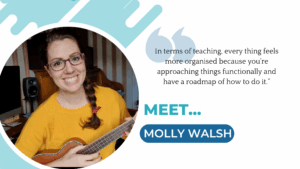The head of vocals at a top London music college reveals the skills and attributes you need to get a teaching job in higher education.
Aussie expat Trudy Kerr has had a stellar performance career. She’s recorded several albums and performed at Ronnie Scott’s, Buckingham Palace and Glastonbury.
She’s also taught vocals at the London College of Contemporary Music (LCCM) in South London for the past ten years.
Currently, LCCM’s head of vocals, Trudy, spoke to BAST about what she looks for when recruiting a singing teacher to join her team.
Professional experience
The first thing I do if someone sends me a CV is look at what sort of singing they do. I don’t look at their teaching so much; I look at their professional experience. This could be their Instagram profile, website or SoundCloud.
Having a performance profile is important because you need to be able to demonstrate and model things for students.
I like young teachers to be out there performing so they have that performance knowledge to share with students.
Vocal pedagogy
When I started teaching, you just needed to be a singer, but that has changed slightly.
I find that these days, more teachers have an understanding of how the voice works, which is a good thing.
In terms of different pedagogies, I’m open to all ideas. A couple of our teachers use different exercises from different methods. Every student learns differently so it’s important that they find someone that they can relate to.
Qualifications
Most of the teaching candidates I see have a degree. Many have also done other courses online – there are so many out there.
Assessment experience
We’re also looking to determine if people know how to work with assessment criteria and learning outcomes. It can be quite useful for teachers to have some understanding of those things.
Complementary skills
If you can play an instrument like the guitar or piano or have songwriting skills – all these can be helpful. [LCCM even offers lessons in rapping, so if you excel at it, don’t forget to mention it.]
The recruitment process – what to expect
At LCCM, a panel of three usually conducts the interviews. We’ll discuss singing [with the candidate] and explain how the college works. Then, sometimes, I watch them teach.
Other times, someone might shadow different teachers for a semester. We had a young teacher who was very keen and had been sitting in on classes for several weeks. Eventually, one of the other teachers was off sick, so we asked her to fill in, and she did a great job.
In some ways, it’s about being in the right place at the right time and being on the radar. The best thing to do is keep in contact or come to some of our events and meet some people.
What to expect if you get a job in higher education
In terms of pay, some conservatoires pay £50 to £60 an hour. Music colleges and secondary schools pay between £30 and £40 an hour.
You’ve also got to remember that each semester is 12 weeks – and there may be two a year, so that’s 24 weeks of teaching. We sometimes also run a summer term, as well.
Sometimes, there is also money for marking and assessing.
Learn more
Listen to Trudy discuss getting a job in higher education on this Singing Teachers Talk podcast episode.
Sign up to study
BAST Training has helped many singers get the qualifications and confidence they need to become singing teachers in private practice and music institutions.
Why not sign up for our Foundation Course or our Level 5 qualification today?
Main image: Canva




